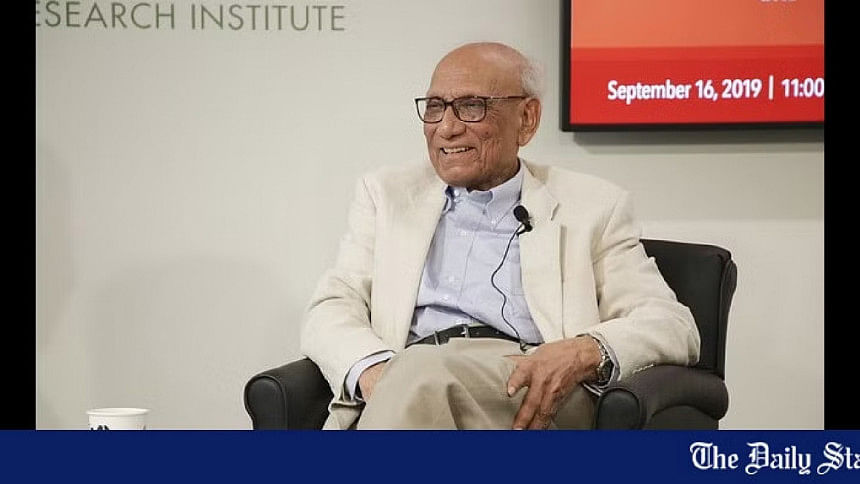‘Nurul Islam’s contribution remarkable in nation building’

Noted economist Prof Nurul Islam's contribution to the independence of Bangladesh and nation building after independence was remarkable as he played a role in diagnosing the disparity between the then East Pakistan and West Pakistan, launch the first five-year plan and enlist Bangladesh as a least developed country (LDC), said economists.
"Prof Islam along with me were both involved in highlighting the disparities between East and West Pakistan which contributed to the preparation of the Six-Point Program presented to the people by Bangabandhu Sheikh Mujibur Rahman," said Prof Rehman Sobhan, a noted economist.
The Six-Point Demand ultimately led to the movement for independence of the country. Prof Nurul Islam's unique quality as a professional economist originated in common sense and pragmatism which influenced his great faith in empirical work, he said.
He was willing to listen and willing to argue, Sobhan added.
His comments came in a discussion titled "Thoughts of Professor Nurul Islam and Contemporary Bangladesh Economy" organized by the Centre for Policy Dialogue (CPD) yesterday.
Prof Mohammed Farashuddin, former governor of Bangladesh Bank, said Nurul Islam was an economist who aimed for the welfare of the people.
AB Mirza Azizul Islam, former adviser to a caretaker government, said Prof Nurul Islam supported availing foreign aid as it had the potential to enable development.
Quoting Nurul Islam, he said the then East Pakistan was deprived of getting its fair share of foreign aid compared to West Pakistan, which created inequality in the development of the two regions.
To improve effectiveness of foreign aid, Prof Nurul Islam suggested in a book to improve good governance and prevent corruption. These are still applicable in today's Bangladesh, he added.
Prof Azizul Islam said International Monetary Fund suggests devaluating the currency in order to tame the imbalance in balance of payments. However, if the currency is devalued, inflation may increase, he said.
If the inflationary pressure come from the outside world, devaluation may further fuel it, he said.
So, abiding by Prof Nurul Islam's view, an economy should allow devaluation gradually so that it does not have a drastic impact, he added.
Prof Mohammed Farashuddin, former governor of Bangladesh Bank, said Nurul Islam was an economist who aimed for the welfare of the people.
He abled to convince the then President Bangabandhu Sheikh Mujibur Rahman to enlist the country in the category of LDCs to get some facilities that ultimately benefitted the country, he said.
Quazi Shahabuddin, former director general of the Bangladesh Institute of Development Studies (BIDS), said Prof Nurul Islam contributed to the nation-building process of Bangladesh.
He rigorously modernised the syllabus of the economics department of the University of Dhaka so that contemporary issues were studied, he said.
Applauding Prof Nurul's contribution to enlisting the country as an LDC, Prof Mustafizur Rahman, a distinguished fellow of the CPD, said Zimbabwe did not enlist as an LDC believing they were in a better position.
The country is paying the price for it and its inflation rate is making world records. But Bangladesh entered in the category and is reaping its fruits even up to this day, he added.
Rushidan Islam Rahman, former research director of the BIDS, said Prof Nurul Islam's views on the two economies prior to Bangladesh achieving independence shows how inequality rises and how it works in the subsector level.
Such works of his give economists a new branch of thought to analyse the inequality, she said, adding that he suggested launching non-farm activities in rural areas to reduce inequality.
Debapriya Bhattacharya, a distinguished fellow of the CPD, moderated the event, held at the CPD office in the capital.
Toufiq Ali, former permanent representative of Bangladesh to World Trade Organization and UN agencies, and Roumeen Islam, senior economic advisor at International Finance Corporation and Prof Nurul Islam's daughter, also virtually spoke at the event.

 For all latest news, follow The Daily Star's Google News channel.
For all latest news, follow The Daily Star's Google News channel. 



Comments